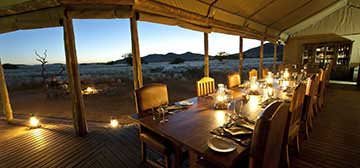
Desert Rhino Camp
- Damaraland, NamibiaDesert Rhino Camp lies amongst rolling, rocky hills of the 450 000-hectare Palmwag Concession.
This is a chance to explore a raw, rugged and impossibly remote slice of African wilderness.
Stay in some of the most unique and dramatic accommodation on the continent- not many can say they’ve slept in a shipwreck after all!
Explore the interior dunes and dry riverbeds and spot the unique desert-dwelling animals, from elephant and lion to brown hyaena.
Learn about the history behind the dramatic shipwrecks that line the mist-enshrouded coastline.
Look for tok-tokkie beetles and the unusual plants and lichens that survive in the cold fog that rolls off the ocean.
Natural Selection felt it only fair that they build a camp to match the remarkable scenery of the Skeleton Coast, and each of the 10 rooms have been constructed to resemble the shipwrecks that line the beach. There are eight twin or double rooms, and two family tents if you’re bringing the kids, all ensuite and solar-powered. Well, apart from the wood burning stove but on the chilly evenings and mornings, it’s most definitely a welcome addition! In the centre of camp, you’ll find an equally as innovatively-designed lounge and restaurant with a wide, wraparound deck and uninterrupted views across the sand, all the way to the Atlantic Ocean.
Game drives within the Skeleton Coast National Park.
Fishing at the coastline (equipment provided).
4×4 excursions to the Clay Castles, the Hoanib River Delta and the Mowe Bay seal colony.
Visits to the Suiderkus and Karimona shipwrecks.
Drive along the Hoarusib River to track desert-adapted elephant.
The Skeleton Coast at first glance looks like another planet where surely none of earth’s species could possibly survive. But look closer and you will discover an incredible variety of highly specialised and endemic desert species. This is the very reason that this park is so important. The Namib Desert is the second driest desert in the world and considered to be the oldest, so species have had a long time to evolve into the incredible creatures they are today. But just as you come to terms with the lunar landscape of hidden creatures, quite bizarrely an elephant or kudu appears on the beach, having followed one of the ephemeral rivers that seasonally spill into the Atlantic along the coastline. Initially, we plan to support the rehabilitation of this park where trucks have scarred some of the landscape leading into the park. Then after that, where to begin in further understanding this amazing ecosystem?!